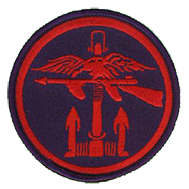The Second World War
September 1943 :
The 4th troop of the 10th interallied Commando leaves Great Britain and embarks on September 10 towards ALGERIA, on board of the “S.S. Athlone Castle” to prepare operations in Italy. The Unit leaves North Africa on November 28 on board of the “Town of Oran”.
December 1943 :
On 2 December 1943, the Unit lands in Toranto in Italy. On December 13, at the disposal of the 8th British Army, it goes up to the front of the SANGRO (patrols, raids, ambushes) and takes part in the attack of PETRILI. Our compatriots integrated in the “N° 10 interallied Commando” will be the first of the Belgian Land forces to be engaged in operations after May 1940.
January 1944 :
Joined to the 5th American Army, it becomes famous on the route of the GARIGLIANO, with the attack of MINTURNO and the seizure of Mount ORNITO. These operations during the winter 43-44 will result in a citation:
ITALIY
« The Belgian Commando Unit has proudly carried our colours on the battle fields of Italy where, by its enthusiasm, it deserved the most beautiful testimonies of the Chiefs under the command of whom it showed the merit of our weapons, in particular during patrols in San Pietro and Montenero, in the attack of the Gustav line in Tremensuoli and Monte Ornito »
March 1944 :
The Unit joins the 4th British Commando Brigade on the island of VIS (Yugoslavia) where partisans of TITO are to be found. It carries out landing operations on the Dalmatian islands occupied by the Germans, and attacks convoys of enemy supplies in the Adriatic sea.
These privateer operations will be rewarded by a second citation:
YOUGOSLAVIA
” The Belgian Commando Unit took part in daring operations of boarding enemy vessels in the island of Vis “.
May 1944 :
The Unit gets back to England, it integrates reinforcements, and goes on training. On 25 August 1944, one of its elements takes part in a reconnaissance raid on the island of YEU off ST NAZAIRE (France).”.
November 1944 :
Brought back to the Belgian coast in October, the “4th Troop” takes part in operation “INFATUATE”, the landing on the island of Walcheren (Netherlands). This fortified place full of guns blocks the Scheldt and the access to Antwerp.
This operation, which was the hardest and most fatal of all, results in a third citation:
WALCHEREN
« The Belgian Commando Unit took part in the operations on the Atlantic coast and in Holland, landed in Westkapelle in the island of Walcheren on November 1, in the first wave of assault of a British Commando Brigade, swam to the coast as its boat had been struck by the fatal fire of the enemy coastal artillery, got to its objective at the time fixed in the initial plan, then took part actively from 1 to 8 November, in the catch of the island, participated with enthusiasm and bravery, in spite of its serious losses in men and Officers, in the seizure of Dombourg and of the dunes in direction of Veere, and seized on this occasion important pieces of equipment »
December 1944 :
Back in Great Britain, the Unit trains the new volunteers just arrived from Achnacarry where they gained their green beret. Fortified by these new recruits, the Unit is then divided up in three “Troops”, the 4th, 9th and 10th as well as a staff, the whole unit under the command of George DANLOY, appointed major.
April 1945 :
Our Commandos get to the village of Emsdetten (Germany) where they are incorporated in the “1 Commando Brigade”. They rush towards the Baltic sea, obtain the surrender of several German units and capture Major PSC HELLEBAUT, Chief of the “Wallonia Legion” and meet the first survivors of the deportation camps.
On May 5, the Belgian Troops arrive in Lubbeck and then reach the Baltic sea.
9 May 1945 :
End of the hostilities.
15 May 1945 :
The “4th troop of the 10th interallied Commando”, that has become “Independent Commando Unit” in April 1945, is renamed “Commando Regiment”.
